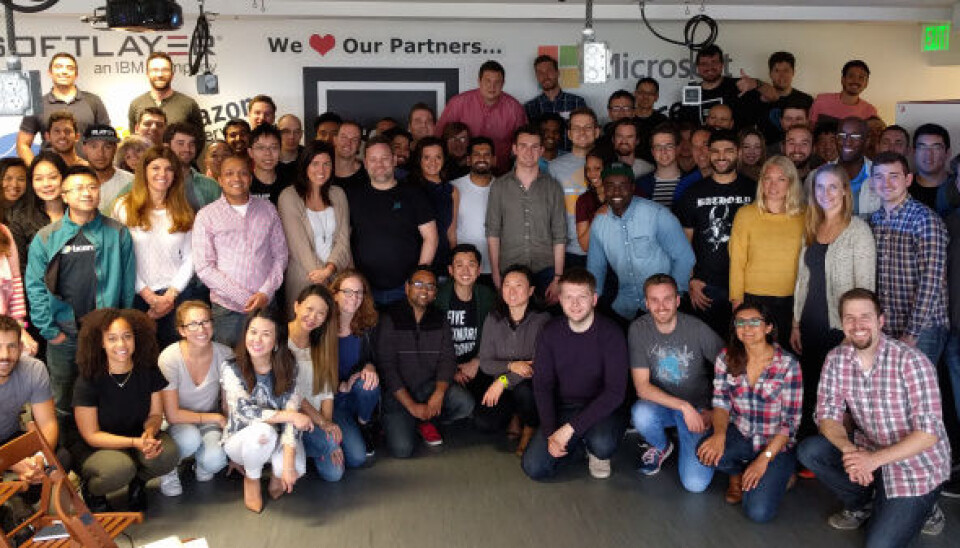-

Technical Support Engineer | NBIM
-

Country Manager Norge | Noteless
-

Partner/Headhunter | Branchy
-

Senior Product Manager | Bakken & Bæck
-

Finance Manager (vikariat) | StartupLab
-

Data Engineer | Klaveness Digital
-

Medeiere* | Boitano AS
-

Chief Operating Officer (COO) | ROEST
-

CEO | Kontur AS
-

VP Marketing | Glint Solar

Villoid: From Norway to Silicon Valley accelerator 500 Startups
By Jarle Snertingdalen, founder and COO of Norwegian startup Villoid
On Friday 22. April we got the phone call from 500 Startups in Silicon Valley; “We’re excited to extend you an offer to join the 500 Accelerator for Batch 17! We're eager to have you join the 500 Family.”
We were thrilled.
Honestly we did not even know exactly what it meant. We just knew it was a unique and rare opportunity and that everyone we talked to said if we were “lucky” enough to get the chance - we should take it.

First test
The program is 4 months long and, and the caveat was: “You have to be here next week”. Some of us have small children, spouses with demanding jobs and others had no visa. 500 startups will not help with accommodation arrangements or practical matters.
This “detail” is no joke, largely due to the extremely high accommodation prices (it is not uncommon that a single room in an ordinary apartment will cost $2.000-3.000 per month). Many sleep in bunk beds, sharing rooms with several people from other companies and startups in the Bay Area.
It’s apparently part of the test – if you want to succeed as a startup, you have to be able to quickly adjust and make major decisions and movement when required. As such, 7 days later 5 of us showed up on time for the first day at the accelerator.
We were now part of the 500 family and the day marked the beginning of our Silicon Valley bootcamp.
On the program were about 40 startups from around the world. Their businesses did everything from food delivery to seniors to drone tech to an ecological funeral service. The diversity was definitely there in every possible way. Quite common questions many of the founders of these businesses had were “What will happen over the next 4 months?” and “What will we actually be doing?”.
"Marketing Hell Week"
Quick backdrop: If selected, 500 Startups invests $125.000 in your company for a 5% convertible note (a loan that will convert into shares at a later point). $25.000 is paid back to 500 Startups right away to cover the costs of being part of the accelerator.

The 5% fixed conversion means 500 often gets a considerable discount on shares bought, however this is normal across all accelerators including Y Combinator and Tech Stars. The value of the program, knowledge, network – and additionally the platform it provides for fundraising, makes it all well worth it.
The first week of the program was called “Marketing Hell Week”. For the next 1,5 weeks there would be back-to-back talks and interactive sessions on product development, growth hacking, email marketing, sales hacking, legal, fundraising frameworks and many other topics – almost all relevant to the startups and the stages they are in. As the crowd was quite small (50-100) the sessions were more interactive and intimate than you would see in a conference, the speakers were generally better and highly relevant. Oftentimes the sessions were not recorded or streamed, as that enabled the speakers to reveal confidential numbers and stories. Naturally getting these types of insights is invaluable to any startup.
Norway has a long way to go
I observed that all the speakers – even though they came from a wide array of companies – such as Pinterest, 500 staff, Venture Capital Funds, Google etc. – had a surprisingly consistent view on how to build and grow a new business. They would refer to the same terms and processes, and responses to frequently asked questions were consistent.
But it also went beyond that and into the very philosophy around building companies. For a non-Silicon Valley entrepreneur it was quite obvious that the startup-scene in the Valley is far more mature. While that may not be surprising, it does become apparent that Norway and likely (all) EU countries have a long way to go.
Starting and growing a start-up is far more a “science” in the Valley than overseas. It has evolved over the 30+ years and as a result there is a sense of common and quite deep understanding on how things are done here.
Nordic Innovation House
Thankfully there are a few Norwegian companies/founders in the Valley. We (Villoid) are going through an accelerator program, Nordic Innovation House is established Palo Alto, and there are other initiatives as well - we attended an entrepreneur-meetup in San Fransisco organized by Anders Mjåset from MESH who had invited Jonas Gahr Støre and others over for a close look at the tech scene and gather several Norwegian entrepreneurs. All these touch-points are extremely valuable as knowledge and startup wisdom is brought back to Oslo/Norway - which is sorely needed.
Not just from a startup methodology perspective, but also on how we can improve government policies, employee incentives, funding structures, tax-programs for investing and investor mindset – all of which are just as important in order to create an eco-system and a culture for starting new businesses and creating new value.
For one – the simple fact that Silicon Valley is the center from where a plethora of successful companies have been born – Norway should be modernized and appreciate the fact that the most efficient way to build a similar culture is to focus on areas where there is sufficient infrastructure and population to support it.
There are obvious synergies of having companies, investors, high level of commercial activity, airports and universities within 30 minutes of travel.
We should nurture Oslo and other hubs instead of actively prioritizing areas that are non sustainable for building startup culture. As a very specific example: Investors need a certain amount of high quality deal-flow, and at the same time start-ups need a certain amount of investors to get funded.
If companies are few and wide-spread then it is far less attractive to be an investor – which in turn makes it more difficult for startups to get funded. Without funding we cannot create value. The alternative is going abroad.
The mentors
After Marketing Hell Week we were assigned two mentors, one on how to fundraise in Silicon Valley and one on Growth. They were both carefully selected to match our business. Being a B2C (Business to Consumer) social service our mentors were accomplished in that space. Getting a new pair of highly qualified eyes to work with us was extremely helpful.
The next weeks were highly dominated by intense work on growing core metrics week-over-week. With the long hours, people usually try to get out of the office on weekends and founders from different companies go on trips together. At 500 Startups there is a strong focus on building the 500 community and the positive atmosphere is contagious.
Fireside chats
A very valuable concept is introduced after a while – the so-called “fireside chats”. On a fireside chat a previous startup founder, usually one who has gone through ups and down, raised funds and eventually sold the company, sits down without a script in a group session with all the founders for an intimate conversation.
The chats are never recorded, as all questions and topics are allowed. The purpose is to dive far deeper down than what is normal. The Fireside Chats are often quite heavy and emotional, and demonstrates that the willingness to share is profound in the entire Valley culture. Past founders are passionate about truly helping new founders succeed, and you cannot do that by only focusing on what went well and painting a perfect picture.
Growth and fundraising
In general the two first months of the accelerator program is focused on growth and the two last months are focused on fundraising. July marks a change where the companies go into pitch training, perfecting Keynote (hardly ever see Powerpoint here) decks and practicing on-stage performance.
On the 2nd of August – 3 months into the program – all 40 companies founders will deliver 2 minute pitches on stage to some 100 VC’s, angel investors and press. This day kicks off fundraising and the month(s) that follow will be dominated by meeting potential investors with the goal to close a round within a few months.
Fundraising is always changing and proves more challenging right now compared to a few years ago, largely due to some bad exits, general uncertainty in the market and Brexit. At 500 Startups - 50%-70% of the companies have (historically) been able to raise a seed or series A round after Demo Day.
So far, it has been an extremely valuable experience. Some people have dubbed a Silicon Valley Accelerator Program as “A start-up MBA on steroids” which is quite accurate, however in addition you also get to grow and fundraise your business.
We are now 2 weeks away from Demo Day, the ultimate climax of the Accelerator Program.
Exciting weeks ahead.



